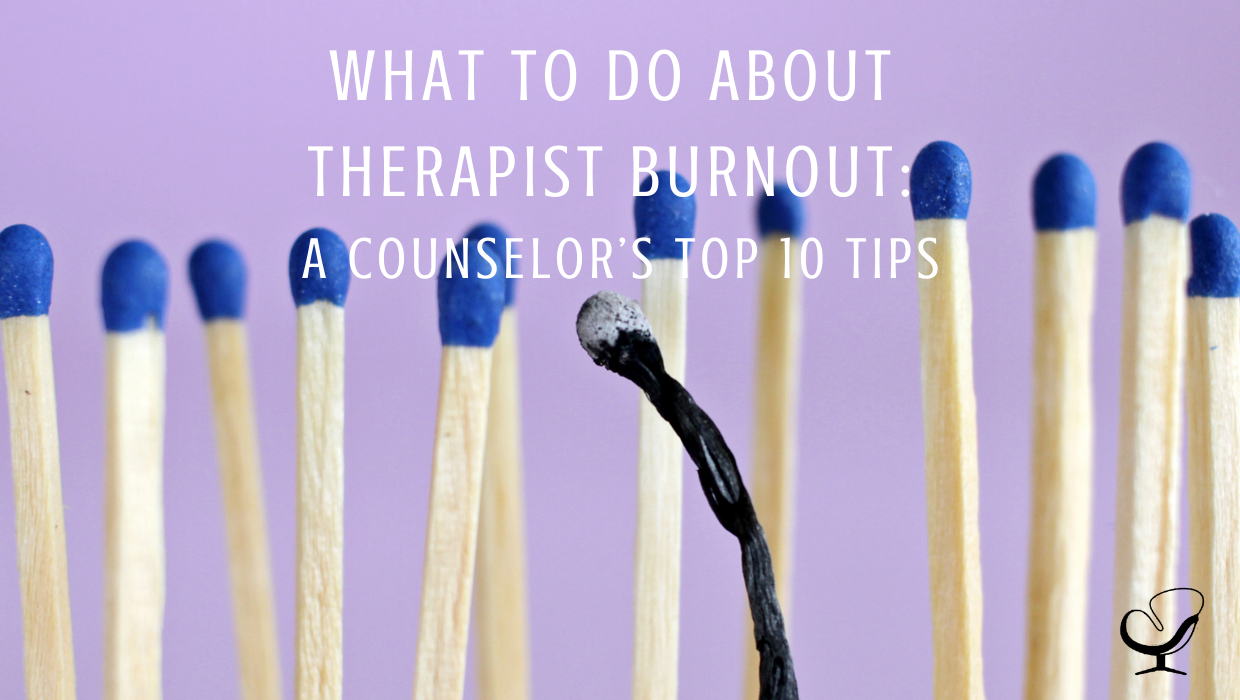In my last blog Burnout, and We Don’t Mean Tires or Lightbulbs: 5 Signs of Burnout to be Aware Of, I encouraged you to see if you have any signs of therapist burnout. Today, I’m talking about what to do if you’re experiencing signs of therapist burnout.
It is completely possible to come back from feeling burnt out and still maintain a long career in the mental health and counseling field, but you need to be active about addressing your burnout and healing yourself.
Here are the top ten tips I have for managing and healing from therapist burnout:
1. Obtain clinical supervision/consultation regularly
This has to be my top tip for therapist burnout prevention. If you are practicing in isolation, or feel isolated despite being part of a group or team, getting individual clinical supervision or consultation will help you process your burnout and create a burnout prevention plan.
2. Join a clinical consultation group of other therapists in your community
Connecting with other therapists in your community to review clinical cases, discuss the rigors of counseling/therapy work, and support each other is essential for helping to prevent burnout. There may be free clinical consultation groups available in your area, but don’t discount paying to obtain good group clinical consultation, it is usually worth it.
3. Make connections through networking in your community with other therapists and providers
Know your community resources and get to know other therapists who specialize in both the same niche and different niches than your practice. Connections can potentially lead to cross-referring, but more importantly you can talk with others who might be experiencing your same struggles, making you feel less alone.
4. Prioritize your self-care
Making time for yourself and caring for your “instrument” that you use in counseling is crucial for longevity in this field. If you’re not taking care of yourself, it’s unlikely you are providing your clients the best that you have to offer.
5. Set limits on the time you spend daily working
Taking time away from your work during the day and limiting the number of counseling hours you do will also help with preventing burnout. Sure, we can all see 8 clients in a day if we have to. But it’s unlikely you can see 8 clients a day, 4-5 days a week, 52 weeks of the year. That is a recipe for burnout. Rest and rejuvenate yourself and then do your best work counseling others!
6. Turn off your brain- leave work at work
The newer you are in the field, the harder it is to turn off your brain and leave work at work. But this is something so important to learn, otherwise you’ll be on a quick path to burnout. Clinical supervision can help you learn this skill, or practicing self-care or mindfulness.
7. Reach out to personal friends and family members, or join new social groups
Make sure you have a supportive, vibrant social life that matches your needs as a person. Connecting with family or friends on a regular basis, or even doing something new, will give you purpose outside of your work.
8. Take a short vacation or stay-cation
Remember to take 2-4 days off every now and then to completely clear your mind, think of future goals, and just relax. You will come back to work re-energized, and if you do this regularly it will help prevent burnout.
9. Turn off all social media for 2 days
The social media trap… try an experiment and turn off your access to all social media for 2 days. Think about how you feel after this. More relaxed? Less stressed? I’m guessing there’s not much you’ll miss and there’s much you will gain not having access to 24/7 news and updates for 2 days.
10. Get your own therapy
Yes! We all need to do our own work. And if you’ve done your own work, great. Keep on working on your personal development. Supportive therapy on an ongoing basis will help you catch early warning signs of burnout and help you stay in the field for the long-term.
After reading all of this, I challenge you to pick 3 things on this list and focus on them for the next year. You can slowly incorporate 1 additional item every few months if you like, but the important thing is to say consistent with your burnout prevention strategy. This is how you will become and stay a great therapist, offering support and counseling to your community for the long-term. I know you can do it!
Previous Articles by Shannon Heers
The Benefits of Listening to a Podcast for Therapists
How to Hire Your First Therapist When You’ve Never Hired Before
Don’t Settle When Hiring Clinicians
Shannon Heers
 Shannon Heers is a licensed professional counselor in Colorado. She owns the private-pay group practice Catalyss Counseling in the Denver metro area, focusing on helping adults manage their anxiety, grief, and trauma. Shannon is also an experienced clinical supervisor and manager who offers business consultation services to other therapists. She balances working with raising her two young children.
Shannon Heers is a licensed professional counselor in Colorado. She owns the private-pay group practice Catalyss Counseling in the Denver metro area, focusing on helping adults manage their anxiety, grief, and trauma. Shannon is also an experienced clinical supervisor and manager who offers business consultation services to other therapists. She balances working with raising her two young children.
Group practice ownership is daunting but can be done easily if you do your homework, prepare, and learn all you can about the process!

